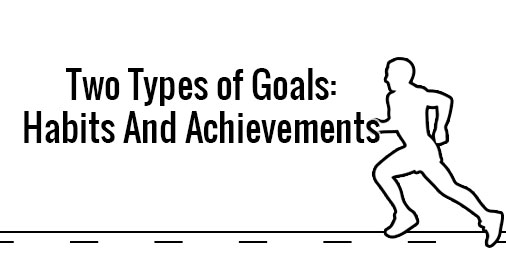 Over time I have rebuilt my philosophy of goal setting into one that is more helpful. Knowing the difference betweenstrategy and tactics is important. But, another aspect that is very foundational that I learned from Michael Hyatt is to make a clear distinction between habit goals and achievement goals. Habit goals are new regular routines that encourage a positive ongoing change in your life such as new exercising routines or wanting to carve time for book reading in your schedule. Achievement goals are SMART goals that you work to accomplish with a set end date. In many cases, achievement goals require new habit goals prior to accomplishing the achievement. For example, a personal goal of mine is to write a book about digital marketing strategy and process. But before I can write a book about digital marketing I need to be:
Over time I have rebuilt my philosophy of goal setting into one that is more helpful. Knowing the difference betweenstrategy and tactics is important. But, another aspect that is very foundational that I learned from Michael Hyatt is to make a clear distinction between habit goals and achievement goals. Habit goals are new regular routines that encourage a positive ongoing change in your life such as new exercising routines or wanting to carve time for book reading in your schedule. Achievement goals are SMART goals that you work to accomplish with a set end date. In many cases, achievement goals require new habit goals prior to accomplishing the achievement. For example, a personal goal of mine is to write a book about digital marketing strategy and process. But before I can write a book about digital marketing I need to be:
- Gaining personal experience in digital marketing
- Reading books about digital marketing and marketing strategy
- Practicing writing
- Improving at my ability to gather knowledge and synthesize them into consumable concepts
As I do these four things, over time I can start to relate what I am learning with personal examples and experiences that can contribute to thought leadership for a marketing book. I can set an achievement goal with an end date but it would cause me too much anxiety. I have a loose date for when I want to have a rough outline but this date, in my mind is very flexible and is dependent on the habit goals that I am currently in progress adding to my routine.
Essentially, if I want to have an achievement goal of writing a book about digital marketing strategy, then I need to develop some new habit goals that will improve my chances of accomplishing the goal. But, only now that I have been working in a digital marketing agency for 3.5 years am I realizing that I might have a book in me. Before then, I simply was embracing the chaos of the job and trying to come up for air. Don’t get me wrong, I have been enjoying the work, but I have been working hard with my head down trying to gain a level of skill in digital marketing. Only now am I capable of doing the job and having more time for writing and reading to reinforce the level of skill and knowledge that I now have. In some ways I am now grasping for new material where before it felt like I was constantly being inundated with new ideas, information, and ways to accomplish things. Where I am now and the knowledge that I continue to grow with is often on the fringes of what I know or complementary and not often directly related to execution of the job, more about communicating concepts more clearly to clients or something like that. New information helps me structure my existing knowledge and build it out further. It also shows areas that I might have something unique to offer to the conversation.
So, in many cases, before you can set big achievement goals like writing a book in digital marketing, you simply need to try new things and put your head down and gain some skills in digital marketing. Then you can make more interesting connections based on your background or your opportunity to step out on the edges of digital marketing. This might mean learning different tactics potentially outside of your necessary core competencies or considering strategic thinking that contribute to your knowledge base or communication style. Along the way, it should be fun and you should find ways to motivate yourself with moments of celebration at different points through the completion of goals. After you gain a fundamental skill, for example, like the execution of core digital marketing tactics, you can start to assess how well it aligns with your personal worldview and your personality and look at what new achievement goals or habit goals that sound fun and you might want to set. A regular quarterly review (every 3 months) is necessary to take your pulse on how things are going. Is it still fun? Does it still align with your worldview? Does something need to change? What habits need to be adjusted based on new knowledge or changes in circumstance that you have encountered?
Primary Steps for Accomplishing Goals Or Creating New Habit Goals
- Establish the amount of change you want to see and the amount or lack of knowledge you have toward accomplishing that goal
- Are there new habits you need to consider in order to gain more knowledge or skill and develop practices that will support growth?
- Are there multiple subjects or disciplines of skill necessary to consider?
- Is this an achievement goal within your existing level of expertise?
- What are the motivational factors for why you want to set these goals?
- Do these align with how you view the world? Are they compelling enough?
- Are the habits you want to establish realistic with the desire in order to be consistent over time?
- Is it interesting to you?
- Is it fun?
- What are the motivational factors for why you want to set these goals?
The first set of questions are revolved around embracing the chaos and the second set of questions are about motivation. You must consider these two lines of thought first. One example is, how will you counteract a negative mindset when you just don’t feel like maintaining your habits today or something gets in your way? Make it mindless. Get everything ready and have it laid out ahead of time. Don’t give your brain the opportunity to talk you out of it.
Then you start to think about establishing consistency over the long term. After gaining new habits and seeing regular practice, only then can you look back at the fuzzy, unclear goals that you thought might be neat to shoot for and see how this can influence specific goals and notice that you are making progress. This is energizing. I don’t allow myself to get too excited when I am developing the habit of practicing. I just review the goal and practice the habit. Come back to the goal on a quarterly basis and ask yourself the same questions again:
- Are these habits still working for me?
- Have I learned something new that might influence my direction? Should I continue or pivot slightly?
- Is it still interesting and fun?
Be sure that you don’t ask these questions in the moment of doing the habit. You need to be pursuing learning and embracing the chaos, your mind will play tricks on you, ignore it and do work. Establish your regular registers to ask these questions and then observe any progress. If possible, there may be ways to measure progress from before to where you are now and help motivate you. Based on the answers to the questions, adjust your goals and get back to the tactics and the habits.

